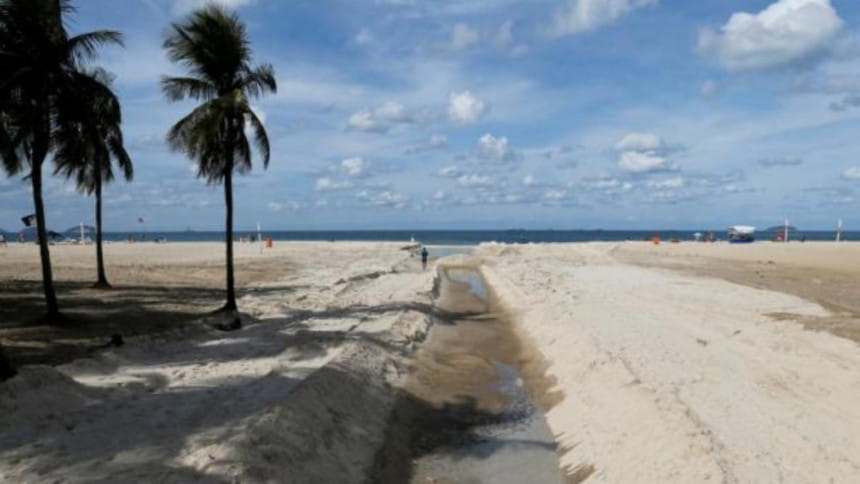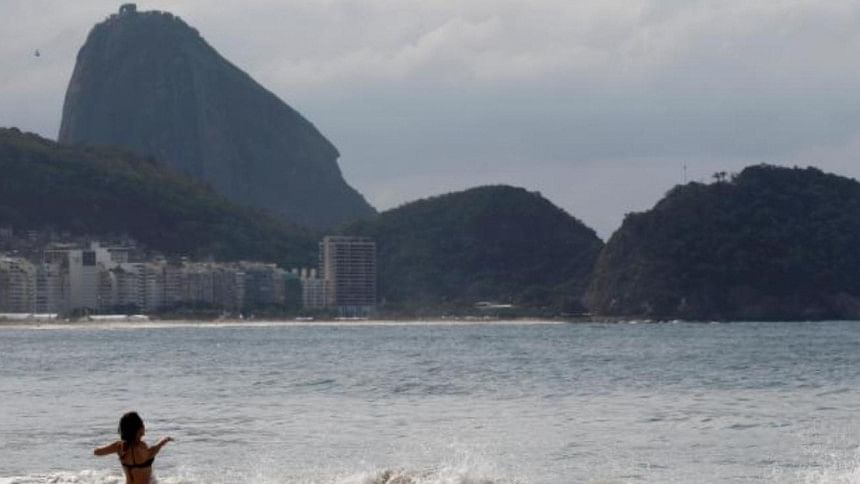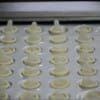'Super bacteria' in Rio's Olympic venues

Scientists have found dangerous drug-resistant "super bacteria" off beaches in Rio de Janeiro that will host Olympic swimming events and in a lagoon where rowing and canoe athletes will compete when the Games start on August 5.
The findings from two unpublished academic studies seen by Reuters concern Rio's most popular spots for tourists and greatly increase the areas known to be infected by the microbes normally found only in hospitals.
They also heighten concerns that Rio's sewage-infested waterways are unsafe.
A study published in late 2014 had shown the presence of the super bacteria - classified by the U.S. Centers for Disease Control and Prevention (CDC) as an urgent public health threat - off one of the beaches in Guanabara Bay, where sailing and wind-surfing events will be held during the Games.
The first of the two new studies, reviewed in September by scientists at the Interscience Conference on Antimicrobial Agents and Chemotherapy in San Diego, showed the presence of the microbes at five of Rio's showcase beaches, including the ocean-front Copacabana, where open-water and triathlon swimming will take place.
The other four were Ipanema, Leblon, Botafogo and Flamengo.
The super bacteria can cause hard-to-treat urinary, gastrointestinal, pulmonary and bloodstream infections, along with meningitis. The CDC says studies show that these bacteria contribute to death in up to half of patients infected.
The second new study, by the Brazilian federal government's Oswaldo Cruz Foundation lab, which will be published next month by the American Society for Microbiology, found the genes of super bacteria in the Rodrigo de Freitas lagoon in the heart of Rio and in a river that empties into Guanabara Bay.
Waste from countless hospitals, in addition to hundreds of thousands of households, pours into storm drains, rivers and streams crisscrossing Rio, allowing the super bacteria to spread outside the city's hospitals in recent years.
Renata Picao, a professor at Rio's federal university and lead researcher of the first study, said the contamination of Rio's famous beaches was the result of a lack of basic sanitation in the metropolitan area of 12 million people.
"These bacteria should not be present in these waters. They should not be present in the sea," said Picao from her lab in northern Rio, itself enveloped by stench from Guanabara Bay.
Cleaning the city's waterways was meant to be one of the Games' greatest legacies and a high-profile promise in the official 2009 bid document Rio used to win the right to host South America's first Olympics.
That goal has instead transformed into an embarrassing failure, with athletes lamenting the stench of sewage and complaining about debris that bangs into and clings to boats in Guanabara Bay, potential hazards for a fair competition.
SITUATION GETTING WORSE
Picao's study, which has undergone internal reviews at Rio's federal university, analyzed water samples taken between September 2013 and September 2014. Using 10 samples taken at five beach locations, the study found super bacteria were most present at Botafogo beach, where all samples were positive.
Flamengo beach, where spectators will gather to watch Olympic sailors vie for medals, had the super bacteria in 90 percent of samples. Ten percent of Copacabana's samples had the microbes.
Ipanema and Leblon beaches, the most popular with tourists, had samples that tested positive for super bacteria 50 and 60 percent of the time, respectively.
The Oswaldo Cruz study of the Olympic lagoon, which was peer reviewed, is based on water samples taken in 2013. It found that the lake is a potential breeding ground for super bacteria and their spread through the city.
While the studies both use water samples that are from 2013 and 2014, Picao and other experts said they had seen no advances in sewerage infrastructure in Rio to improve the situation.
Valerie Harwood, an expert in recreational water contamination and antibiotic-resistant bacteria at the University of South Florida who was not involved in the studies, said that if anything, things were getting worse, as the super bacteria naturally spread by infecting other microbes.
The contamination has prompted federal police and prosecutors to investigate whether Rio's water utility Cedae is committing environmental crimes by lying about how much sewage it treats. Investigators are also looking into where billions of dollars in funds went since the early 1990s, money earmarked to improve sewage services and clean Guanabara Bay.
Cedae has denied any wrongdoing. It said in an emailed statement that any super bacteria found at the beaches or the Olympic lagoon must be the result of illegal dumping into storm drains. Cedae said it carries out sewage treatment and collection in the entire "south zone" of Rio, where the bodies of water are located and where the water samples were taken.
'LIKE CANDY'
Five scientists consulted by Reuters said the immediate risk to people's health when faced with super bacteria infection depends on the state of their immune systems.
These bacteria are opportunistic microbes that can enter the body, lie dormant, then attack at a later date when a healthy person may fall ill for another reason.
Super bacteria infect not only humans but also otherwise-harmless bacteria present in the waters, turning them into antibiotic-resistant germs.
Harwood said the super bacteria genes discovered in the Olympic lagoon were probably not harmful if swallowed by themselves: they need to be cocooned inside of a bacterium.
"Those genes are like candy. They are organic molecules and they'll be eaten up by other bacteria, other organisms," Harwood said. "That's where the danger is - if a person then ingests that infected organism - because it will make it through their gastrointestinal tract and potentially make someone ill."
The presence of the super bacteria genes in the lagoon indicates the bacteria themselves had recently died or simply were not detected by testing, Harwood said.
Health experts say Rio's poor wastewater management has already created endemic illnesses associated with sewage that disproportionately impact the city's poor, including gastrointestinal and respiratory problems, Hepatitis A and severe heart and brain conditions.
Rio's Olympic organizing committee referred questions on water quality to state authorities.
Rio state's Inea environmental agency said in an emailed statement it follows the World Health Organization's recommendations for testing recreational water safety, and that searching for super bacteria is not included in that. It also said there was a lack of studies about the bacteria in water and health outcomes.


 For all latest news, follow The Daily Star's Google News channel.
For all latest news, follow The Daily Star's Google News channel. 





Comments